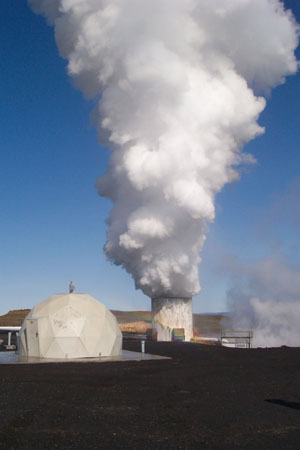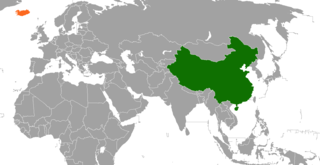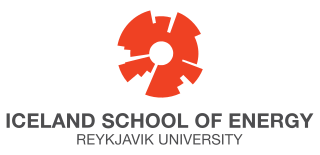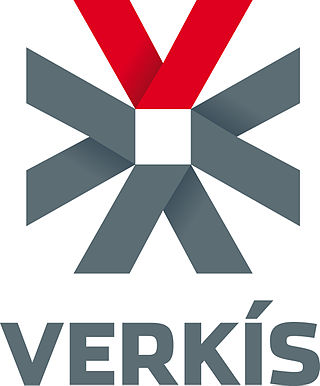Related Research Articles

The United Nations University (UNU) is the think tank and academic arm of the United Nations. Headquartered in Shibuya, Tokyo, Japan, with diplomatic status as a UN institution, its mission is to help resolve global issues related to human development and welfare through collaborative research and education.

Geothermal power in Iceland refers to the use of geothermal energy in Iceland for electricity generation.

Iceland is a world leader in renewable energy. 100% of the electricity in Iceland's electricity grid is produced from renewable resources. In terms of total energy supply, 85% of the total primary energy supply in Iceland is derived from domestically produced renewable energy sources. Geothermal energy provided about 65% of primary energy in 2016, the share of hydropower was 20%, and the share of fossil fuels was 15%.

China–Iceland relations formally began on 8 December 1971, when Iceland recognised Beijing. Prior to the signing of a Free Trade Agreement between the two countries in 2013, diplomatic activities between them were relatively few in number. However, since this event, political cooperation has increased. There is growing number of economic and cultural ties, as their political partnership has expanded.

The Hellisheiði Power Station is the eighth-largest geothermal power station in the world and largest in Iceland. The facility is located in Hengill, southwest Iceland, 11 km (7 mi) from the Nesjavellir Geothermal Power Station. The plant has a capacity of 303 MW of electricity and 200 MWth of hot water for Reykjavík's district heating. The power station is owned and operated by ON Power, a subsidiary of Reykjavík Energy.

Mannvit Engineering is an engineering firm in Iceland. Mannvit offers engineering, consulting, management, operational and EPCM services to projects all over the world. Mannvit core activities include: geothermal and hydroelectric power development, geothermal district heating, infrastructure and transportation, buildings, renewable energy and climate, environmental consulting, power transmission, industry, IT and telecommunications. Company headquarters are in Kópavogur, Iceland.

The Iceland School of Energy is an international graduate school within the Department of Engineering at Reykjavik University, the largest private university in Iceland. ISE is jointly owned by Reykjavik Energy, Reykjavik University, and Iceland GeoSurvey, and specialises in the fields of Sustainable Energy and Electric Power.

Verkís Consulting Engineers is the oldest consulting firm in Iceland and is one of the largest engineering firms in Iceland with around 350 employees. Verkís is a multidisciplinary consulting firm, providing services in all fields of engineering and related professional disciplines of consulting. Verkís offers engineering, consulting, management, operational and EPCM services. Core disciplines include geothermal and hydroelectric power and Verkís has participated in nearly all geothermal and hydroelectric projects in Iceland as well as in several projects abroad. Other core disciplines include geothermal district heating, power transmission, buildings, transport, infrastructure and industry. Ever since the early 1930s, Verkís has participated in the engineering of most of Iceland's biggest and most prominent construction projects, covering disciplines such as civil and structural design, mechanical engineering, electrical HV, MV, and LV engineering, systems engineering, automation and control. Egill Viðarsson is the CEO and Snæbjörn Jónsson is the chairman of the board. The headquarters are in Reykjavík but in addition there are eleven branches around Iceland.

Judi Wangalwa Wakhungu EGH is a Kenyan politician, diplomat, and geologist who was appointed by the President of Kenya, Uhuru Kenyatta, as ambassador to France on the 26th of January 2018. Immediately prior to her present position, she served as the cabinet secretary for environment and regional development authorities from 25 April 2013 until 17 January 2018.

This article describes energy and electricity production, consumption, import and export in Kenya. Kenya's current effective installed electricity capacity is 2,651 megawatts (MW), with peak demand of 1,912 MW, as of November 2019. At that time, demand was rising at a calculated rate of 3.6 percent annually, given that peak demand was 1,770 MW, at the beginning of 2018. Electricity supply is mostly generated by renewable sources with the majority coming from geothermal power and hydroelectricity.

Most of Kenya's electricity is generated by renewable energy sources. Access to reliable, affordable, and sustainable energy is one of the 17 main goals of the United Nations’ Sustainable Development Goals. Development of the energy sector is also critical to help Kenya achieve the goals in Kenya Vision 2030 to become a newly industrializing, middle-income country. With an installed power capacity of 2,819 MW, Kenya currently generates 826 MW hydroelectric power, 828 geothermal power, 749 MW thermal power, 331 MW wind power, and the rest from solar and biomass sources. Kenya is the largest geothermal energy producer in Africa and also has the largest wind farm on the continent. In March 2011, Kenya opened Africa's first carbon exchange to promote investments in renewable energy projects. Kenya has also been selected as a pilot country under the Scaling-Up Renewable Energy Programmes in Low Income Countries Programme to increase deployment of renewable energy solutions in low-income countries. Despite significant strides in renewable energy development, about a quarter of the Kenyan population still lacks access to electricity, necessitating policy changes to diversify the energy generation mix and promote public-private partnerships for financing renewable energy projects.

Tver State University is university in the city of Tver, the oldest and one of the largest universities in the Tver region.
The Menengai III Geothermal Power Station is a 35 MW (47,000 hp) geothermal power plant in Kenya. The power station reached full commercial commissioning in August 2023.

Fatima Denton is a British-Gambian climatologist. She is the director at the Ghanaian branch of the United Nations University, at the UNU Institute for Natural Resources in Africa (UNU-INRA) in Accra. She focuses on innovation, science, technology and natural resource management. She partners with countries such as Benin and Liberia to develop and implement country needs assessment missions.

Rebecca Miano is a Kenyan lawyer and a continental business leader, currently serving as Cabinet Secretary for Tourism and Wildlife. She previously served as the Cabinet Secretary for Investments, Trade & Industry from October 2023 to July 2024. She is a former Cabinet Secretary for East African Community, the ASALs and Regional Development.Before joining Cabinet, she was the Managing Director and Chief Executive Officer of KenGen Plc., the largest producer of electricity in the East African region from November 2017. She was confirmed on 1 November 2017, having served in acting capacity since August 2017.

Gladys Chepkirui Ngetich is a Kenyan engineer, and a Rhodes scholar, pursuing a doctorate degree in aerospace engineering at the University of Oxford, in the United Kingdom. She is the recipient of the Tanenbaum Fellowship and the Babaroa Excellence Award.
Cynthia Wandia is a Kenyan electrical engineer, polyglot, entrepreneur, businesswoman and corporate executive, who is the chief executive officer and co-founder of Kwara Limited, a Kenya-based online and mobile banking platform for financial cooperatives, credit unions and community banks. She concurrently serves as the managing director of ASTRA Innovations, a German-based enterprise that she co-founded.
The Turkana Geothermal Power Station, is a 140 megawatts (187,743 hp) geothermal power station under development in Kenya.
The Olkaria VII Geothermal Power Station, also known as the Olkaria VII Geothermal Power Plant, is a proposed geothermal power station in Kenya. The feasibility studies which will inform the design and generation capacity of this renewable energy infrastructure is ongoing, as of March 2022. The proposed generation capacity ranges from 83 megawatts, to 140 megawatts. The plant is owned and under development by Kenya Electricity Generating Company (KenGen), the electricity generation parastatal company in Kenya.
Norah Magero is a Kenyan mechanical engineer and renewable energy expert. She is the co-founder and CEO of Drop Access, a social enterprise that provides affordable and practical energy solutions for rural and underserved communities. She is widely recognized for developing the VacciBox, a solar-powered portable refrigerator designed to store and transport vaccines and other temperature-sensitive medical supplies in remote areas. She is the first Kenyan and second woman globally to win the Africa Prize for Engineering Innovation by the Royal Academy of Engineering.
References
- 1 2 3 4 5 6 "Top 40 Under 40 Women In Kenya 2018" (PDF). Business Daily Africa . Nairobi: Nation Media Group. September 2018. Archived (PDF) from the original on 29 September 2018. Retrieved 4 January 2019.
- ↑ UNU-GTP (2016). "Winnie Adhiambo Apiyo: United Nations University, Geothermal Training Program, 2016". Reykjavík: UNU-Geothermal Training Program (UNU-GTP). Archived from the original on 9 July 2019. Retrieved 4 January 2019.
- 1 2 Iceland School of Energy (18 December 2018). "Winnie Apiyo receives the 2017 Women in Energy Innovation Award: Topic: Automatic Blockage of Grid Energy Back Feed Project". Reykjavik: Iceland School of Energy. Archived from the original on 5 January 2019. Retrieved 4 January 2019.